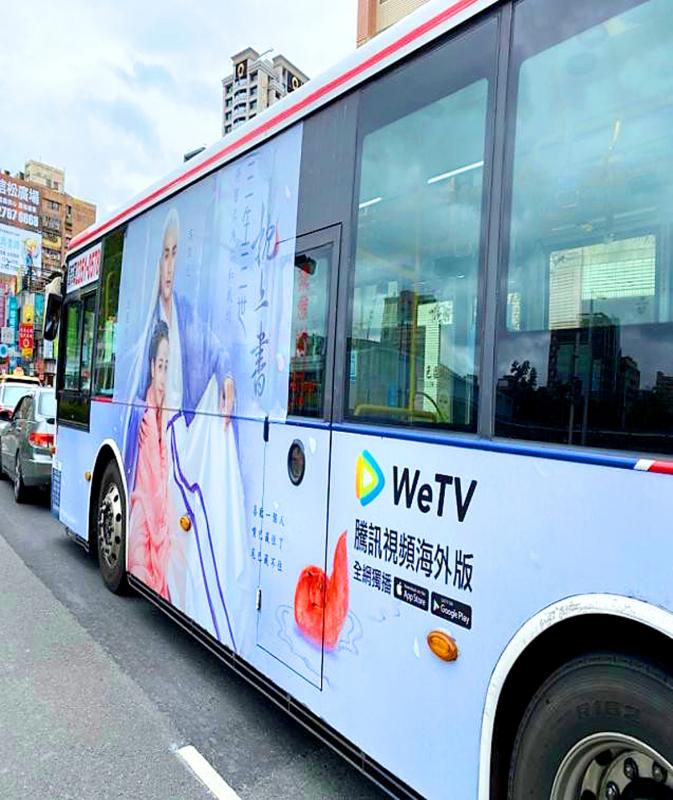The government is to introduce legislation to prevent Chinese media outlets from exploiting a legal loophole to illegally operate over-the-top (OTT) services in Taiwan, Executive Yuan spokeswoman Kolas Yotaka said yesterday, amid reports that China Central Television (CCTV) could soon begin services in the nation.
The Chinese-language Liberty Times (sister newspaper of the Taipei Times) on Wednesday reported that CCTV plans to follow the model of Chinese OTT service providers iQiyi (愛奇藝) and Tencent Video (騰訊視頻), and begin operations in Taiwan.
The companies have been able to skirt a rule banning Chinese OTT service providers from operating in Taiwan without permission by contracting local distributors and platform providers, the Liberty Times said.

Photo courtesy of a reader
Asked to comment on the report, Kolas described the model as a “breach of democracy,” whose existence the government would not sit back and tolerate.
The government would introduce new legislation or amendments to existing laws to keep Chinese OTT service providers from exploiting the loophole, Kolas said, adding that legislative efforts were set in motion last year.
Reiterating that the government prohibits any foreign OTT service provider from operating in the nation without its permission, she said it is regrettable that some Chinese companies have circumvented the rule by enlisting local partners.
As some people have paid for membership of the services, any forthcoming changes would guarantee that their rights are protected, she added.
After iQiyi’s application to launch local operations was rejected by the National Communications Commission in 2016, it has been operating under a partnership with its local distributor, OTT (歐銻銻).
Pan-green camp lawmakers have since expressed concerns that programs offered on the Web site could contain content aimed at pushing Beijing’s “united front” agenda.
The commission yesterday said that the government is drafting an act to govern OTT content, adding that it could be used to handle issues related to Chinese operators.
The bill stipulates that issues related to the Chinese firms — such as their use of partners to circumvent local laws to broadcast OTT content in Taiwan — would be addressed through the collective efforts of various government agencies, it said.
The Act Governing Relations Between the People of the Taiwan Area and the Mainland Area (臺灣地區與大陸地區人民關係條例) stipulates that Chinese companies can only invest in certain categories of goods and services, which do not include OTT broadcasts, it added.
Regarding reports that Chinese OTT providers have been promoting their services and garnering members through their local agents, the commission said that it is handling the matter to ensure that operators comply with the nation’s laws.
The Cabinet on Sept. 26 last year decided that OTT services would be jointly overseen by the commission, the Ministry of Culture and the Mainland Affairs Council, it said.
The commission oversees OTT broadcasts from abroad, but Chinese content — including movies, prerecorded shows, and radio and TV programs — would first be subject to regulation by the ministry and the council, it added.
The commission said that it would soon unveil the bill after discussions with all other relevant government agencies.
This story has been amended since it was first published.

AIR SUPPORT: The Ministry of National Defense thanked the US for the delivery, adding that it was an indicator of the White House’s commitment to the Taiwan Relations Act Deputy Minister of National Defense Po Horng-huei (柏鴻輝) and Representative to the US Alexander Yui on Friday attended a delivery ceremony for the first of Taiwan’s long-awaited 66 F-16C/D Block 70 jets at a Lockheed Martin Corp factory in Greenville, South Carolina. “We are so proud to be the global home of the F-16 and to support Taiwan’s air defense capabilities,” US Representative William Timmons wrote on X, alongside a photograph of Taiwanese and US officials at the event. The F-16C/D Block 70 jets Taiwan ordered have the same capabilities as aircraft that had been upgraded to F-16Vs. The batch of Lockheed Martin

GRIDLOCK: The National Fire Agency’s Special Search and Rescue team is on standby to travel to the countries to help out with the rescue effort A powerful earthquake rocked Myanmar and neighboring Thailand yesterday, killing at least three people in Bangkok and burying dozens when a high-rise building under construction collapsed. Footage shared on social media from Myanmar’s second-largest city showed widespread destruction, raising fears that many were trapped under the rubble or killed. The magnitude 7.7 earthquake, with an epicenter near Mandalay in Myanmar, struck at midday and was followed by a strong magnitude 6.4 aftershock. The extent of death, injury and destruction — especially in Myanmar, which is embroiled in a civil war and where information is tightly controlled at the best of times —

Taiwan was ranked the fourth-safest country in the world with a score of 82.9, trailing only Andorra, the United Arab Emirates and Qatar in Numbeo’s Safety Index by Country report. Taiwan’s score improved by 0.1 points compared with last year’s mid-year report, which had Taiwan fourth with a score of 82.8. However, both scores were lower than in last year’s first review, when Taiwan scored 83.3, and are a long way from when Taiwan was named the second-safest country in the world in 2021, scoring 84.8. Taiwan ranked higher than Singapore in ninth with a score of 77.4 and Japan in 10th with

China's military today said it began joint army, navy and rocket force exercises around Taiwan to "serve as a stern warning and powerful deterrent against Taiwanese independence," calling President William Lai (賴清德) a "parasite." The exercises come after Lai called Beijing a "foreign hostile force" last month. More than 10 Chinese military ships approached close to Taiwan's 24 nautical mile (44.4km) contiguous zone this morning and Taiwan sent its own warships to respond, two senior Taiwanese officials said. Taiwan has not yet detected any live fire by the Chinese military so far, one of the officials said. The drills took place after US Secretary